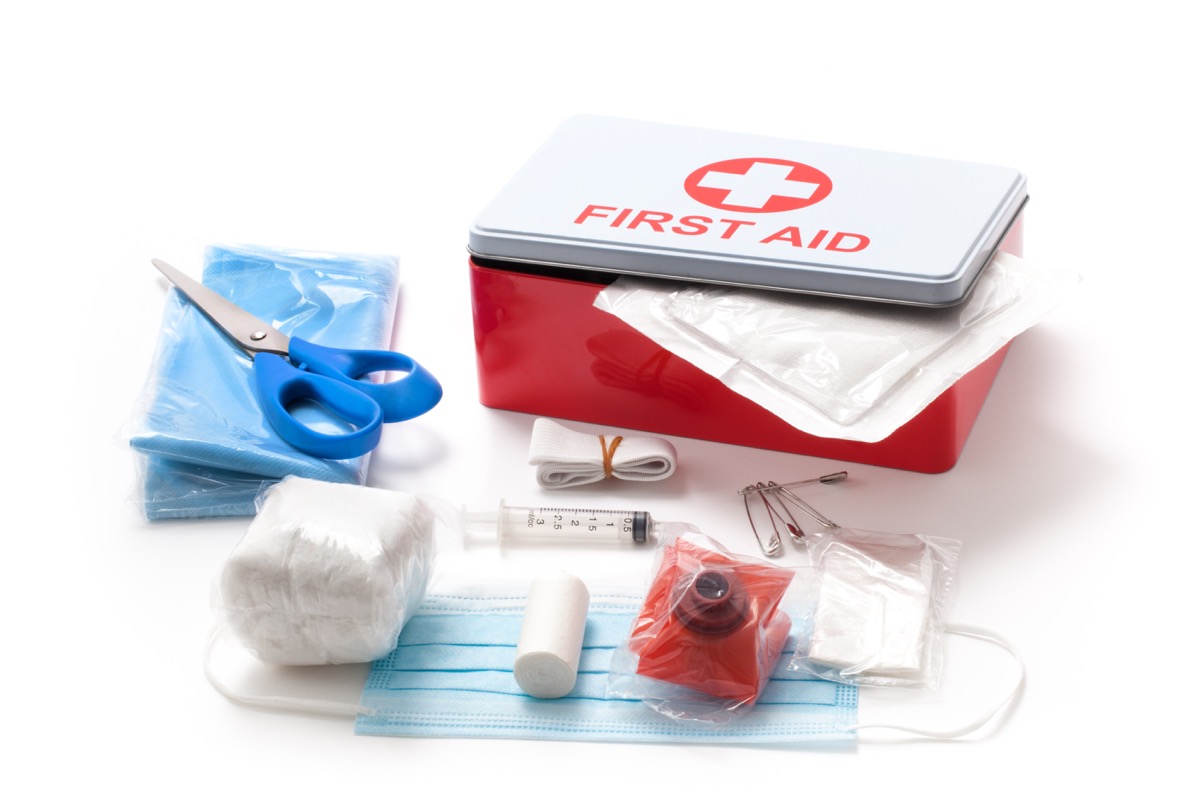4 Things Everyone Over 65 Needs in Their Medicine Cabinet

As you get older, the odds of developing certain ailments increase. Many doctors recommend combating these changes with a healthy diet and exercise, but you may also benefit from making a few key changes to your medicine cabinet, too. By being prepared with the right products, you’ll be better able to tackle the health pitfalls commonly associated with aging—just be sure to speak with your doctor before stocking up on your new supplies. Read on to learn the four items everyone over 65 needs in their medicine cabinet, and why they’re great to have on hand.
READ THIS NEXT: Taking These Medications for Even a Short Time Spikes Your Dementia Risk.
A first aid kit.

Common changes associated with aging—such as worsening eyesight, hearing, strength, or balance—can increase your risk of suffering a serious fall. Medications that are common among seniors can also impair balance, making you more likely to become injured in your home as you age.
That’s why it’s so important for everyone over 65 to be prepared with a first aid kit in their medicine cabinet. “Every second of every day, an older adult (age 65+) suffers a fall in the U.S.—making falls the leading cause of injury and injury death in this age group,” says the Centers for Disease Control and Prevention (CDC). “One out of four older adults will fall each year in the United States, making falls a public health concern, particularly among the aging population.”
READ THIS NEXT: This Is Why Your High Blood Pressure Isn’t Responding to Medication.
Anti-inflammatory pain relievers.

It’s no secret that many of us experience increased aches and pains as we get older. “As we age, our muscles get tighter, our tendons and ligaments become less flexible, and our bodies take longer to heal from injury,” said Donald Ford, MD, MBA, the Chair of the Department of Family Medicine at the Cleveland Clinic in a 2018 podcast. That’s why it’s useful to keep anti-inflammatory pain relievers on hand, to address flare-ups. “So as long as you’ve got healthy kidneys, you can take anti-inflammatory medications,” says Ford.
However, he warns against making them a regular part of your routine unless you’ve discussed it with your doctor. “Even anti-inflammatories like Motrin or Advil are things that can damage your kidneys in the long run if you take too much of them and you’re not being careful,” he notes. By exercising and stretching regularly, you may be able to help ward off such pains without the risk of side effects.
Cold medications.

Everyone—regardless of age—has experienced the common cold, but seniors run the risk of developing more severe symptoms than their younger counterparts. “Even a minor cold can be dangerous for older adults, whose immune systems don’t fight off pathogens as effectively as they once did,” explains the National Council on Aging. “That’s why cold and flu season is a particularly dangerous time of year for people age 65 and older,” their experts write.
They further note that a cold can “lead to pneumonia, an acute illness that takes the lives of thousands of people in the U.S. each year. Additionally, if you have a chronic condition such as asthma, COPD, or emphysema, a cold can intensify the symptoms from those conditions for several weeks after your cold symptoms have resolved.” Keeping cold medications in your medicine cabinet can help mitigate these symptoms, reducing your risk of an escalating problem.
For more health news sent directly to your inbox, sign up for our daily newsletter.
Heartburn medications.

Many seniors find that as they age, they are more prone to heartburn than in their youth. This may be due to side effects of medication, aging muscles which can weaken the lower esophageal sphincter, weight gain, or hiatal hernia—a stomach condition present in 60 percent of adults over 60.
“There is not any clear age where things take a nosedive, but as we age, heartburn becomes more of a problem,” says gastroenterologist Scott Gabbard, MD, a gastroenterologist with the Cleveland Clinic. “Studies show that one-fourth of people over age 75 take medication for heartburn,” he says.
Speak with your doctor for more tips on stocking your medicine cabinet with products that suit seniors over 65.
Best Life offers the most up-to-date information from top experts, new research, and health agencies, but our content is not meant to be a substitute for professional guidance. When it comes to the medication you’re taking or any other health questions you have, always consult your healthcare provider directly.